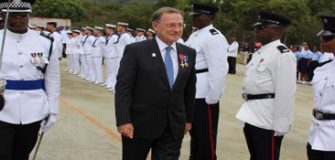Preventing vehicular fires…your ego, pocket and life will thank you for it!
Share
[blockquote style=”1″]“Try your best to keep your vehicle maintained, you should have it checked, just like you have regular doctor checkups? You should have regular vehicular checkups,” Chief Fire Officer Zebalon Mc Clean advises as a preventative measure against the occurrence of vehicle fires.[/blockquote]
It may be under-reported here in the Virgin Islands, but vehicle fires are no understatement, particularly as records show that over three hundred vehicles have suffered that fate in the past 10 years and, according to Chief Fire Officer of the VI Fire and Rescue Service Zebalon Mc Clean, having a small fire extinguisher and a regular full service checkup at one of the many garages could save you not only the embarrassment of stalling traffic for hours because of a leak or a broken wire, that are two of the main causes of vehicle fires, but the inconvenience of being out of a vehicle due to the extent of the fire damage or even death!
For this year alone, nine vehicles have encountered a vehicular fire, in 2015-thirty four, in 2014-twenty five, in 2013-twenty seven, in 2012-thirty-three , in 2011-thirty six, in 2010 twenty five), in 2009 twenty nine, in 2008 thirty one, in 2007 thirty and in 2006 thirty-two, making it a total of three hundred and eleven (311) in the past ten years.
“Two of the main causes are when you have problems with the wiring and you have an electrical short (broken wire) resulting in sparks that might eventually land on something that is flammable and causes a small flame that eventually spread to the rest of the vehicle. The other cause is if you have a leak somewhere and you have some sort of fuel that drips down on the hot metal of the engine or some part of the undercarriage. Eventually, that is going to get hotter and hotter until it causes something that can be burnt to ignite,” Chief Fire Officer Mc Clean told VI Life & Style Magazine. He said these faults could be remedied by a visit to the mechanic. “Try your best to keep your vehicle maintained, you should have it checked. Just like you have regular doctor checkups, you should have regular vehicular checkups.”
Mc Clean lamented that in most cases unless something is wrong with a vehicle it is not brought to the vehicle doctor. He also recommended an investment in a fire extinguisher. “An extinguisher is an investment, if you don’t get one quickly, you might have to pay at most a couple hundred to fix that part back, but when you lose the entire engine and the body you have lost everything and you cannot always rely on the insurance companies to bail you out.”
The Fire Chief cautioned vehicle owners that nowadays, many of the insurance policies have changed and right now when a car gets to a certain age it is no longer comprehensive and they are not on a big money drive either. “They take a very hard look at the vehicle and if what they call negligence or foul play or anything, then whatever you receive back may not be enough to pay bus fare much less to get a new vehicle.”
In the event there is a vehicle fire, Fire and Rescue Service should be called in even though the fire is put out. “Can’t take any chances,” he warned, pointing out that vehicle fires can lead to death particularly when one is not wearing the right shoes, like slippers and sandals that can get caught in the pedal, thus exposing yourself to more danger. As it relates to public sensitization, Chief Mc Clean informed that the general public has been provided with educational information but bemoaned that it is not being read as they would want it to, but the work in that regard continues.
This is the Fire and Rescue Service’s 30th year since its inception when it was separated from the Royal Virgin Islands Police Force in 1986. There are six stations, three in Tortola, one in Anegada, Jos Van Dyke, and Virgin Gorda and a full complement of 58 officers.



